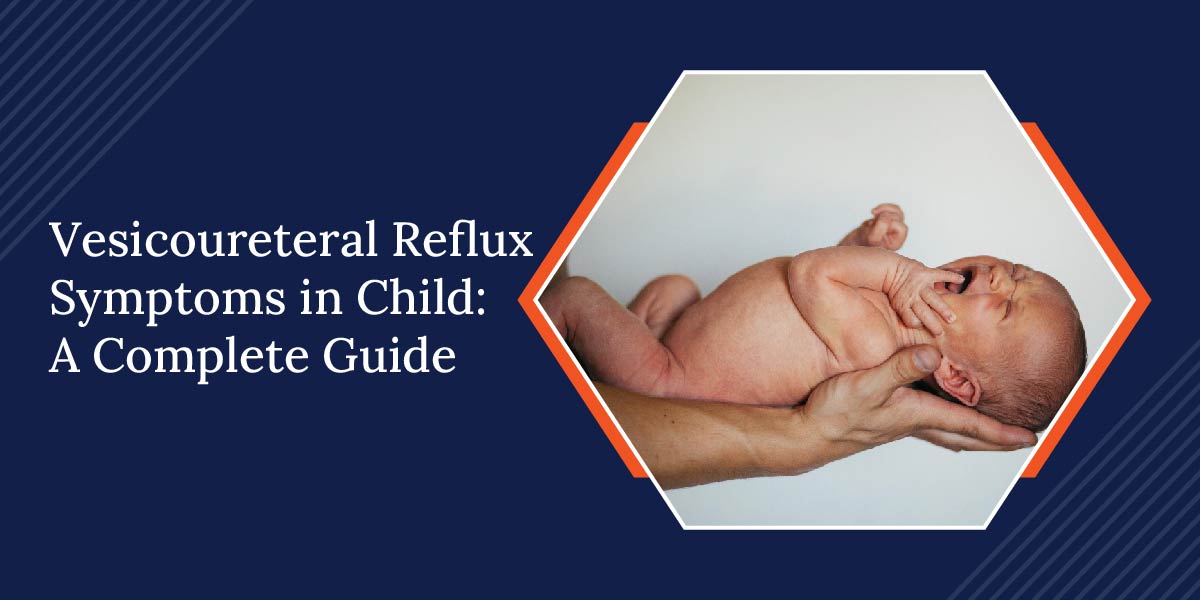What if your child’s frequent fevers and infections are more than just growing pains? Vesicoureteral reflux (VUR) is a condition that affects approximately 1-3% of children, and many parents are unaware of its signs. The reverse flow of urine from the bladder into the kidneys may cause serious complications when undetected. Understanding the symptoms of vesicoureteral reflux in children can avert kidney damage, recurrent infections, and other persistent health problems. This is a thorough guide that covers everything that you should know about vesicoureteral reflux symptoms in a child, their diagnosis, treatment solutions, and effective management strategies to protect your child’s kidney health.
A] What is Vesicoureteral Reflux (VUR)?
Have you ever thought about why there are children who experience non-stop urinary tract infections? Vesicoureteral reflux in children occurs when urine flows backwards from the bladder to the ureters and potentially up to the kidney level, disrupting normal one-way flow. In a healthy urinary system, urine usually flows through the ureters to the bladder and then exits through the urethra.
VUR has two main types: primary VUR and secondary VUR. Primary VUR results from a congenital defect where the ureter enters the bladder at an incorrect angle. Whereas secondary VUR is a condition caused by obstruction or dysfunction of the bladder. The grading ranges from Grade I (mild reflux into the ureter) to Grade V (severe reflux and involving the kidney). This grading scale assists a paediatric urologist in deciding on the most effective treatment for vesicoureteral reflux in children.
Concerned About VUR? Talk to a Specialist Today!
B] Why Early Detection is Crucial: Risks of Untreated VUR
Delayed diagnosis can result in your child losing their kidney function. Untreated VUR creates major health risks that extend beyond childhood. Recurrent urinary infections may cause kidney scarring (reflux nephropathy), affecting up to 30% of children with high-grade VUR. Such scarring can reduce kidney function, blood pressure, and, in severe situations, kidney disease, leading to dialysis.
Identifying problems early allows parents to seek timely intervention. By being able to recognise the vesicoureteral reflux symptoms in a child, parents can assist healthcare providers in implementing protective measures that would prevent permanent damage. The window for preventing complications is often narrow, which makes parental consciousness a key element for positive results.
C] Key Symptoms of Vesicoureteral Reflux in Children
The symptoms of vesicoureteral reflux in children depend significantly on their age group and make recognition challenging but important for parents and caretakers.
The Primary Indicator: Recurrent Urinary Tract Infections (UTIs)
Recurrent UTIs are the most common symptom of VUR. They occur due to stagnant backflow of urine, which creates an environment for bacteria to grow. The most prevalent UTIs in children are isolated and require no VUR assessment; however, recurrent infections indicate their establishment and should prompt further investigation.
Symptoms by Age Group:
- Infants (Under 1 Year): The youngest patients are the most challenging cases to diagnose. Parents should look for symptoms like unexplained fever without any apparent cause, poor dietary pattern, constant irritation, nausea and vomiting, and poor growth even with good nutrition. These general symptoms require parental awareness and early medical attention.
- Toddlers & Preschoolers (1-5 Years): This age group usually complain of painful or very frequent urination, abdominal or flank pains, frequent unexplained fevers, bedwetting in previously toilet-trained children, and daytime urinary accidents. Parents must pay attention to the repeated regression in toilet training along with other symptoms.
- Older Children & Adolescents (Over 5 Years): School-age children more clearly communicate their symptoms of vesicoureteral reflux in a child, including recurrent UTIs with classic symptoms (burning, frequency, urgency), persistent flank or lower back pain, elevated blood pressure discovered during routine checkups, unexplained poor growth or fatigue, and complaints of feeling generally unwell.
D] When to Seek Medical Attention
Are you missing critical warning signs that require immediate attention? Certain symptoms demand urgent medical evaluation. Any child experiencing recurrent fevers with or without identifiable UTI symptoms warrant VUR assessment. New-onset bedwetting in previously trained children, especially when accompanied by pain or fever, requires investigation.
Parents should also seek evaluation for persistent abdominal or flank pain, unexplained growth retardation or hypertension. The importance of consulting a paediatric urologist or a children’s nephrologist cannot be overstated, and they are the right professionals for the appropriate VUR diagnosis and management. Dr. Bhushanrao Jadhav is the best paediatric surgeon in Dubai, specialising in complete paediatric urologic services.
E] Diagnosing VUR: What to Expect
Step 1: Clinical Assessment
The doctor will review the medical history of your child, including any past UTIs, growth concerns, and urinary patterns, followed by physical examinations.
Step 2: Laboratory Tests
Urinalysis and urine cultures are used to examine infection and guide antibiotics if required.
Step 3: Imaging Studies
- Renal Ultrasound: This is non-invasive, evaluates the kidney size, structure, and signs of damage.
- Voiding Cystourethrogram (VCUG): The gold standard that provides diagnosis of VUR, shows if and how the urine flows backwards.
- DMSA Scan: This detects scars in the kidneys and assesses functioning.
These tests provide a clear image of how severe the problem is and guide paediatric surgeons to take informed treatment decisions.
F] Treatment Options for VUR
Treatment will depend on certain criteria such as your child’s age, the grade of VUR, infection history, and the kidney’s health.
1. Conservative Management
For lower grades (I-III), most children outgrow VUR naturally with age. Strategies include:
- Watchful Waiting: Close observations with a periodical imaging and urine tests.
- Antibiotic Prophylaxis: Low-dose antibiotics are used to prevent UTIs in the case of delayed natural resolution.
- Risk Factor Management: Preventing constipation, acute hydration, and encouraging regular bladder emptying.
2. Surgical Interventions
If VUR is severe (Grade IV-V), persistent, or leads to frequent kidney infections despite medication, surgical treatment becomes necessary. The surgery options are:
- Endoscopic injection (Deflux) is a minimally invasive procedure; an endoscope is inserted to rectify the defective valve and injected to correct it.
- Ureteral reimplantation is a more invasive surgery; the procedure involves repositioning of the ureter to prevent backflow.
3. Managing Secondary VUR
If reflux is caused by another problem, such as bladder outlet obstruction, urethral valves, or neurological bladder dysfunction, treating that underlying cause is essential to resolve the reflux.
Parents often ask: Will my child need surgery? Not always. In fact, most cases of treatment for vesicoureteral reflux in children begin with conservative care, reserving surgery for persistent or complicated cases.
G] Living with VUR: Long-Term Care & Prevention
Timely diagnosis with VUR and prompt care allow children to live normal, active lives. Below are a few care and tips suggestions one must follow:
Follow-Up Care
Regular kidney check-ups, blood pressure tests, and periodic imaging are some essential tests to ensure the kidneys remain healthy.
Lifestyle Tips
- Make sure your child drinks plenty of water every day
- Maintain a frequent urination schedule
- Teach appropriate hygiene to limit the risk of UTIs
- Keep your diet rich in fibre to prevent constipation
Medication Adherence
If your child is on antibiotic prophylaxis, it is essential to maintain consistency to prevent infection and kidney damage. Missing doses defeat months of progress.
Concerned About VUR? Talk to a Specialist Today!
Conclusion
Understanding the presence of vesicoureteral reflux symptoms in a child empowers the parent to seek early medical intervention, probably preventing the complications associated with the kidneys. While VUR is a daunting task, early detection along with appropriate medical management leads to excellent results in most children. The key lies in being vigilant of warning symptoms, seeking expert paediatric urologist care, and following a prescribed treatment regimen. Remember, many children with VUR live completely healthy lives with proper management and follow-up.
Are you worried about the urinary health of your child, or do you suspect that they may have symptoms of VUR? Don’t wait! Contact Dr. Bhushanrao today for expert care, compassionate assessment, and treatment.

Dr. Bhushanrao Jadhav
Dr. Bhushanrao Jadhav is a highly skilled Pediatric Surgeon and Urologist specialising in minimally invasive and robotic surgeries for children. With advanced training from leading institutions in the UK, India and USA, he brings expertise in treating complex genitourinary conditions and neonatal surgical ailments. Driven by compassion and innovation, Dr. Jadhav has pioneered pediatric robotic surgery programs in Pune, India, ensuring world-class care tailored to children’s unique needs.





















